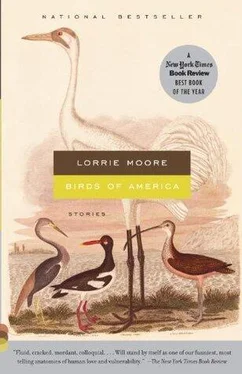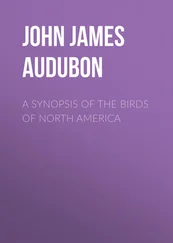Ruth began staying inside, drinking tea. She felt tightenings, pain and vertigo, but then, was that so new? It seemed her body, so mysterious and apart from her, could only produce illness. Though once, of course, it had produced Mitzy. How had it done that? Mitzy was the only good thing her body had ever been able to grow. She was a real chunk of change that one, a gorgeous george. How had her body done it? How does a body ever do it? Life inhabits life. Birds inhabit trees. Bones sprout bones. Blood gathers and makes new blood.
A miracle of manufacturing.
On one particular afternoon that was too cool for spring, when Ruth was sitting inside drinking tea so hot it skinned her tongue, she heard something. Upstairs, there was the old pacing in the attic that she had come to ignore. But now there was a knock on the door — loud, rhythmic, urgent. There were voices outside.
“Yes?” Ruth called, approaching the entryway, then opening the door.
Before her stood a girl, maybe fourteen or fifteen years old. “We heard there was a party here,” said the girl. She had tar black hair and a silver ring through her upper lip. Her eyes looked meek and lost. “Me and Arianna heard down on State Street that there was a party right here at this house.”
“There’s not,” said Ruth. “There’s just not.” And then she closed the door, firmly.
But looking out the window, Ruth could see more teenagers gathering in front of the house. They collected on the lawn like fruit flies on fruit. Some sat on the front steps. Some roared up on mopeds. Some hopped out of station wagons crowded with more kids just like themselves. One carload of kids poured out of the car, marched right up the front steps, and, without ringing the bell, opened the unlocked door and walked in.
Ruth put her tea down on the bookcase and walked toward the front entryway. “ Excuse me!” she said, facing the kids in the front hall.
The kids stopped and stared at her. “May I help you?” asked Ruth.
“We’re visiting someone who lives here.”
“ I live here.”
“We were invited to a party by a kid who lives here.”
“There is no kid who lives here. And there is no party.”
“There’s no kid who lives here?”
“No, there isn’t.”
A voice suddenly came from behind Ruth. A voice more proprietary, a voice from deeper within the house than even she was. “Yes, there is,” it said.
Ruth turned and saw standing in the middle of her living room a fifteen-year-old boy dressed entirely in black, his head shaved spottily, his ears, nose, lips, and eyebrows pierced with multiple gold and copper rings. The rim of his left ear held three bronze clips.
“Who are you?” Ruth asked. Her heart flapped and fluttered, like something hit sloppily by a car.
“I’m Tod.”
“Tod?”
“People call me Ed.”
“Ed?”
“I live here.”
“No, you don’t. You don’t! What do you mean, you live here?”
“I’ve been living in your attic.”
“You have?” Ruth felt sweat burst forth from behind the wings of her nose. “You’re our ghost? You’ve been pacing around upstairs?”
“Yeah, he has,” said one of the kids at the door.
“But I don’t understand.” Ruth reached over and plucked a Kleenex from the box on the mail table, and wiped her face with it.
“I ran away from my own home months ago. I have a key to this house from the prior owner, who was a friend. So from time to time, I’ve been sleeping upstairs in your attic. It’s not so bad up there.”
“You’ve been what? You’ve been living here, going in and out? Don’t your parents know where you are?” Ruth asked.
“Look, I’m sorry about this party,” said Tod. “I didn’t mean for it to get this out of hand. I only invited a few people. I thought you were going away. It was supposed to be a small party. I didn’t mean for it to be a big party.”
“No,” said Ruth. “You don’t seem to understand. Big party, little party: you weren’t supposed to have a party here at all. You were not even supposed to be in this house, let alone invite others to join you.”
“But I had the key. I thought, I don’t know. I thought it would be all right.”
“Give me the key. Right now. Give me the key.”
He handed her the key, with a smirk. “I don’t know if it’ll do you any good. Look.” Ruth turned and all the kids at the door held up their own shiny brass keys. “I made copies,” said Tod.
Ruth began to shriek. “Get out of here! Get out of here right now! All of you! Not only will I have these locks changed but if you ever set foot in this neighborhood again, I’ll have the police on you so fast, you won’t know what hit you.”
“But we need some place to drink, man,” said one of the departing boys.
“Go to the damn park!”
“The cops are all over the park,” one girl whined.
“Then go to the railroad tracks, like we used to do, for God’s sake,” she yelled. “Just get the hell out of here.” She was shocked by the bourgeois venom and indignation in her own voice. She had, after all, once been a hippie. She had taken a lot of windowpane and preached about the evils of private ownership from a red Orlon blanket on a street corner in Chicago.
Life: what an absurd little story it always made.
“Sorry,” said Tod. He touched her arm, and, swinging a cloth satchel over his shoulder, walked toward the front door with the rest of them.
“Get the hell out of here,” she said. “Ed.”
The geese, the crows, the squirrels, the raccoons, the bats, the ants, the kids: Ruth now went to the firing range with Carla as often as she could. She would stand with her feet apart, both hands grasping the gun, then fire. She concentrated, tried to gather bits of strength in her, crumbs to make a loaf. She had been given way too much to cope with in life. Did God have her mixed up with someone else? Get a Job, she shouted silently to God. Get a real Job. I have never been your true and faithful servant. Then she would pull the trigger. When you told a stupid joke to God and got no response, was it that the joke was too stupid, or not quite stupid enough? She narrowed her eyes. Mostly, she just tried to squint, but then dread closed her eyes entirely. She fired again. Why did she not feel more spirited about this, the way Carla did? Ruth breathed deeply before firing, noting the Amazonian asymmetry of her breath, but in her heart she knew she was a mouse. A mouse bearing firearms, but a mouse nonetheless.
“Maybe I should have an affair,” said Carla, who then fired her pistol into the gunnysacked hay. “I’ve been thinking: maybe you should, too.”
Now Ruth fired her own gun, its great storm of sound filling her ears. An affair? The idea of taking her clothes off and being with someone who wasn’t a medical specialist just seemed ridiculous. Pointless and terrifying. Why would people do it? “Having an affair is for the young,” said Ruth. “It’s like taking drugs or jumping off cliffs. Why would you want to jump off a cliff?”
“Oh,” said Carla. “You obviously haven’t seen some of the cliffs I’ve seen.”
Ruth sighed. Perhaps, if she knew a man in town who was friendly and attractive, she might — what? What might she do? She felt the opposite of sexy. She felt busy, managerial, thirsty, crazy; everything, when you got right down to it, was the opposite of sexy. If she knew a man in town, she would — would go on a diet for him! But not Jenny Craig. She’d heard of someone who had died on Jenny Craig. If she had to go on a diet with a fake woman’s name on it, she would go on the Betty Crocker diet, her own face ladled right in there with Betty’s, in that fat red spoon. Yes, if she knew a man in town, perhaps she would let the excitement of knowing him seize the stem of her brain and energize her days. As long as it was only the stem; as long as the petals were left alone. She needed all her petals.
Читать дальше












